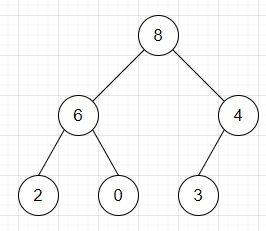
 Data Structure
Data Structure Networking
Networking RDBMS
RDBMS Operating System
Operating System Java
Java MS Excel
MS Excel iOS
iOS HTML
HTML CSS
CSS Android
Android Python
Python C Programming
C Programming C++
C++ C#
C# MongoDB
MongoDB MySQL
MySQL Javascript
Javascript PHP
PHP
- Selected Reading
- UPSC IAS Exams Notes
- Developer's Best Practices
- Questions and Answers
- Effective Resume Writing
- HR Interview Questions
- Computer Glossary
- Who is Who
Program to check heap is forming max heap or not in Python
Suppose we have a list representing a heap tree. As we know heap is a complete binary tree. We have to check whether the elements are forming max heap or not. As we know for max heap every element is larger than both of its children.
So, if the input is like nums = [8, 6, 4, 2, 0, 3], then the output will be True because, all elements are larger than their children.

To solve this, we will follow these steps −
- n := size of nums
- for i in range 0 to n - 1, do
- m := i * 2
- num := nums[i]
- if m + 1 < n, then
- if num < nums[m + 1], then
- return False
- if num < nums[m + 1], then
- if m + 2 < n, then
- if num < nums[m + 2], then
- return False
- if num < nums[m + 2], then
- return True
Example
Let us see the following implementation to get better understanding −
def solve(nums): n = len(nums) for i in range(n): m = i * 2 num = nums[i] if m + 1 < n: if num < nums[m + 1]: return False if m + 2 < n: if num < nums[m + 2]: return False return True nums = [8, 6, 4, 2, 0, 3] print(solve(nums))
Input
[8, 6, 4, 2, 0, 3]
Output
True

Advertisements
